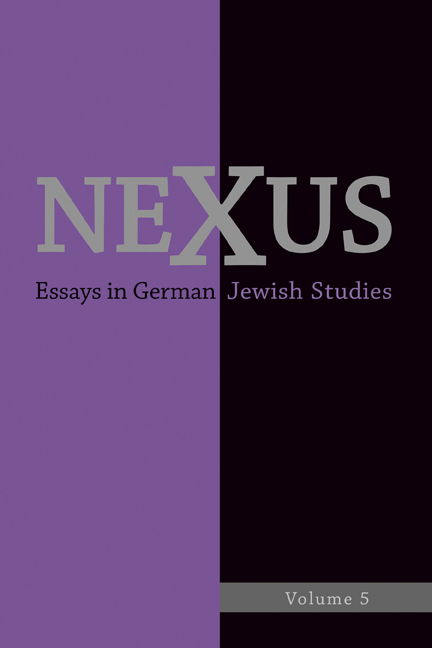 Nexus: Essays in German Jewish Studies, Volume 5
Nexus: Essays in German Jewish Studies, Volume 5 Book contents
- Frontmatter
- Dedication
- Contents
- Miscellaneous Frontmatter
- Introduction: Moments of Enlightenment for Jews and Other Germans
- Remembering Jonathan
- Jonathan M. Hess: Curriculum Vitae
- Maurice Sendak’s Dear Mili: A Contrapuntal Elegy
- Pluralism and the Modernized Jesus in Mendelssohn, Schiller, and Schleiermacher
- The Papal Game: Telling a Jewish Story from the Mayse bukh, Ayzik Meyer Dik and Marcus Lehmann
- The Fuzziness of Jewish and Non-Jewish Boundaries in Viennese Popular Culture around 1900: A Trend Toward “Similarity”?
- Freeing the Shtetl from the Ghetto Prism: Sholem Asch and Dovid Bergelson in German Translation
- A Poetics of Genocide: The Jewish Dead Confront the Germans in Katzenelson’s Warsaw Ghetto Poem “Vey dir”
- Appendix: “Vey dir”
- The New Ostjude and the Enlightened Ostdeutschen: Jewish Theater in the German Democratic Republic
- German Jewish lengevitch: A Plurilingual Poetics of Meddling
Freeing the Shtetl from the Ghetto Prism: Sholem Asch and Dovid Bergelson in German Translation
Published online by Cambridge University Press: 24 March 2021
- Frontmatter
- Dedication
- Contents
- Miscellaneous Frontmatter
- Introduction: Moments of Enlightenment for Jews and Other Germans
- Remembering Jonathan
- Jonathan M. Hess: Curriculum Vitae
- Maurice Sendak’s Dear Mili: A Contrapuntal Elegy
- Pluralism and the Modernized Jesus in Mendelssohn, Schiller, and Schleiermacher
- The Papal Game: Telling a Jewish Story from the Mayse bukh, Ayzik Meyer Dik and Marcus Lehmann
- The Fuzziness of Jewish and Non-Jewish Boundaries in Viennese Popular Culture around 1900: A Trend Toward “Similarity”?
- Freeing the Shtetl from the Ghetto Prism: Sholem Asch and Dovid Bergelson in German Translation
- A Poetics of Genocide: The Jewish Dead Confront the Germans in Katzenelson’s Warsaw Ghetto Poem “Vey dir”
- Appendix: “Vey dir”
- The New Ostjude and the Enlightened Ostdeutschen: Jewish Theater in the German Democratic Republic
- German Jewish lengevitch: A Plurilingual Poetics of Meddling
Summary
Introduction
THE HISTORY OF TENSIONS between German and East European Jews is well-known. Many studies have dealt with the subject in one capacity or another, and it is well established in popular opinion as well. One expression of these tensions was the attitude in Germany toward the Yiddish language, something conveyed, among other things, in the ways works of Yiddish literature were transmitted to German-speaking audiences. Early attempts at such transmission and translation tended, as a matter or course and without further reflection, to rewrite the shtetl as “ghetto,” presenting it as such even when other words might show up for the term in a given translation. Hence, while the translation by Stefania Goldenring of a volume of stories by Sholem Asch (1880–1957) published in 1907 renders “shtetl” as “Städtchen,” that usage is subordinated to the volume's title Bilder aus dem Ghetto. This problem went beyond just one volume. In a series of treatments and reviews written for the Allgemeine Zeitung des Judentums Ludwig Geiger, the renowned German literary historian and sometime editor of the popular liberal journal, subsumed the works of Yiddish writers like I. L. Peretz and Sholem Aleichem as well as Sholem Asch under the genre Ghettoliteratur. Although it was a “venerated genre” in the Allgemeine Zeitung, as Hans Otto Horch notes, the Ghettoliteratur designation did not prevent Geiger from contrasting a Yiddish writer like Asch with the more esteemed English writer Israel Zangwill, and concluding: “bei Asch ist alles fremd, die Welt in der er lebt und die er beschreibt, ist eine, die wir nicht kennen und in der uns, wenn wir in sie träten, der Atem verschlägt” (with Asch, everything is foreign, the world in which he lives and which he describes, is one that we do not know and which, were we to enter it, would take our breath would be taken away). Still, one also finds attempts to challenge this image of the shtetl as ghetto and its implications for mediating Yiddish culture. Those attempts found expression in other translations from Yiddish and in other reviews of the translations and critical assessments of Yiddish writing more generally.
- Type
- Chapter
- Information
- Nexus: Essays in German Jewish Studies, Volume 5Moments of Enlightenment: In Memory of Jonathan M. Hess, pp. 115 - 134Publisher: Boydell & BrewerPrint publication year: 2021


